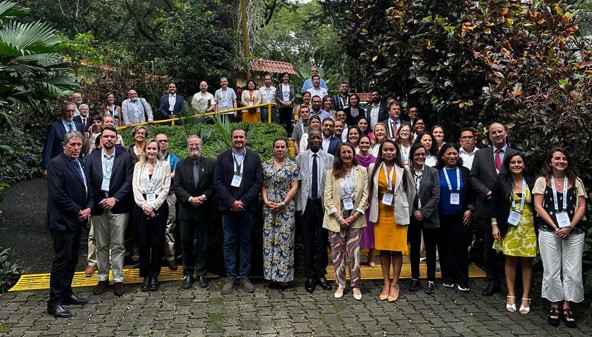ECLAC Reinforces the Call for Regional Collaboration on Sustainable Water Management at the XXV CODIA and XVI PHI-LAC Meetings in Costa Rica
Work area(s)
ECLAC took part in the XVI Meeting of National Committees and Focal Points of UNESCO’s Intergovernmental Hydrological Programme for Latin America and the Caribbean (PHI-LAC) in Costa Rica on November 4 and 5. Additionally, it participated in the XXV Conference of Ibero-American Water Directors and Authorities (CODIA), in Puntarenas, Costa Rica, on November 7 and 8, 2024, under the framework of the Technical Dialogue on “Water Use Efficiency and Integrated Water Resources Management (IWRM)”.

ECLAC gave a presentation on the “Economic Valuation of Water,” emphasizing the major challenges that water management in Latin America and the Caribbean currently faces, both due to scarcity in critical areas and to the rising demand driven by population growth and economic development. This situation requires sustained investment in infrastructure—from water treatment and distribution to the protection of sources—and a detailed analysis of the costs associated with production, conservation, and management. The institution underlined that incorporating the value of ecosystems into water pricing is fundamental to ensuring equitable access and the long-term sustainability of water resources, thereby fostering a culture of rational and efficient use.
In this regard, ECLAC stressed the strategic role of pricing mechanisms, as they convey clear signals to users about the real cost of the resource, encouraging efficiency and responsible behavior. Some countries in the region have opted for regulated prices designed to ensure equity and cost recovery, while others apply market-based prices responsive to supply and demand—though these require robust oversight. Additionally, taxes and payments for ecosystem services are also considered effective tools for reinforcing environmental co-responsibility, ensuring that those who benefit from water contribute to the preservation of the watersheds and ecosystems that supply it.
ECLAC noted that no single solution can be applied across all contexts. Chile, for instance, manages water-use rights within a market framework; Costa Rica is recognized for its approach to payments for environmental services; and Jamaica and Mexico combine multiple instruments to tackle specific industrial, agricultural, and domestic challenges. Residential tariffs for drinking water and sanitation vary greatly, making it urgent to design tariff policies that balance cost recovery with affordability—particularly for the most vulnerable sectors. Failing to address inequalities in household spending on water and sanitation further widens social gaps and curtails quality services for low-income populations.
Looking ahead, ECLAC recommends an integrated approach that goes beyond cost recovery and guarantees affordability for low-income communities. To this end, it proposes implementing selective subsidies and progressive tariff structures while strengthening transparency and local capacities in resource management. This integrated strategy aims to establish a robust framework for water governance that can meet present and future demands, including climate change adaptation.
Finally, ECLAC highlighted the work carried out by the Regional Expert Group, which collaborates to ensure universal access to water and sanitation. The institution expressed special gratitude to CODIA and UNESCO for the invitation and for the synergy accomplished through various regional and national activities. It concluded by underscoring that sustainable water management is essential for driving the transformations needed to create a more productive, inclusive, and sustainable Latin America and Caribbean. In this endeavor, technical, operational, political, and forward-looking (TOPP) capacities play a pivotal role, providing key instruments for formulating and executing effective public policies that can comprehensively and proactively address the region’s escalating water demands—a process currently being spearheaded by the Executive Secretary.